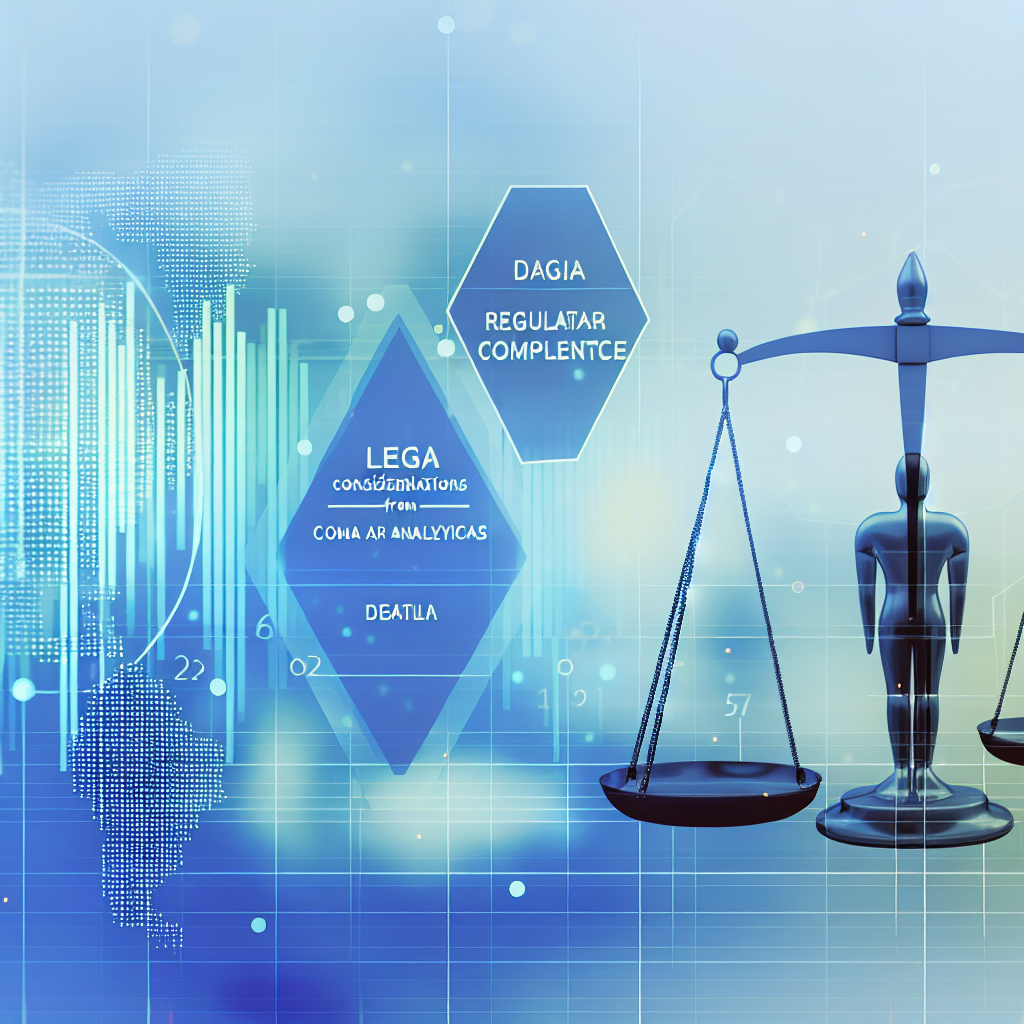
Data Analytics for Regulatory Compliance: Legal Considerations
Data Analytics for Regulatory Compliance: Legal Considerations
In today’s rapidly evolving regulatory landscape, companies face mounting pressure to ensure compliance while balancing operational efficiency and data integrity. As regulatory requirements become increasingly complex, businesses must leverage data analytics to navigate these challenges effectively. This article explores the legal considerations surrounding data analytics for regulatory compliance, emphasizing how organizations can utilize analytics while adhering to necessary legal frameworks.
Understanding the Role of Data Analytics in Compliance
What is Data Analytics?
Data analytics refers to the systematic computational analysis of data sets. In the context of regulatory compliance, it involves examining data to draw conclusions about compliance practices, identifying potential risks, and ensuring adherence to laws and regulations. Companies can use analytics to monitor compliance in real-time, assess the effectiveness of their compliance programs, and facilitate reporting requirements.
The Importance of Compliance Analytics
- Risk Management: Effective data analytics can identify compliance risks before they escalate into significant issues, allowing organizations to take proactive measures.
- Enhanced Decision-Making: By analyzing compliance-related data, businesses can make informed decisions that align with regulatory requirements while driving operational performance.
- Improved Transparency: Utilizing data analytics fosters greater transparency in compliance processes crucial for relationships with regulators and stakeholders.
Legal Considerations When Using Data Analytics for Compliance
Data Privacy and Protection
One of the paramount concerns for organizations engaging in data analytics for regulatory compliance is data privacy. Legislation such as the General Data Protection Regulation (GDPR) in the UK and Europe and the California Consumer Privacy Act (CCPA) in the U.S. imposes strict rules on how personal data is collected, stored, and utilized. Companies must ensure compliance by:
- Implementing data minimization practices, only collecting data necessary for compliance.
- Obtaining consent when required for processing personal data.
- Implementing robust security measures to protect data from breaches.
Regulatory Frameworks and Standards
Various jurisdictions have established different regulatory frameworks governing data analytics, particularly concerning compliance. In the U.S., for instance, organizations in industries such as finance and healthcare must abide by specific regulations like the Sarbanes-Oxley Act and the Health Insurance Portability and Accountability Act (HIPAA). Similarly, in the U.K. and UAE, compliance with local laws and international standards is essential. Companies should maintain an up-to-date understanding of these regulations as they apply to data analytics:
- Identify applicable laws and standards pertinent to your industry.
- Regularly conduct audits to ensure compliance with evolving regulations.
- Engage in training practices to keep staff informed on regulatory requirements.
Litigation Risks
With the rise of data-related regulations, organizations face increased litigation risks associated with non-compliance. Companies engaging in data analytics must consider the following:
- Document all compliance-related data analytics processes to defend against potential legal challenges.
- Implement internal policies that govern the use of data analytics in compliance to reduce the likelihood of litigation.
- Consult with legal experts to understand your exposure to litigation risks.
Best Practices for Implementing Data Analytics in Legal Compliance
Develop a Clear Compliance Strategy
Establishing a clear compliance strategy is crucial for any organization intending to leverage data analytics for regulatory compliance. This strategy should encompass:
- A well-defined framework that aligns data analytics initiatives with compliance goals.
- Regularly updating policies to reflect changes in regulations and business needs.
- Cross-departmental collaboration to ensure integrated compliance efforts.
Invest in Technology and Tools
To capitalize on the benefits of data analytics, organizations must invest in appropriate technology and tools:
- Utilize advanced analytics tools that enable predictive modeling and real-time data analysis.
- Implement data visualization solutions for easier interpretation of compliance trends.
- Adopt secure cloud platforms that enhance data security and comply with industry standards.
Engage Stakeholders
Stakeholder engagement is essential in creating a culture of compliance within an organization. This includes:
- Training employees on data privacy and compliance implications of analytics.
- Encouraging open communication about compliance challenges and solutions.
- Establishing a whistleblower policy that supports reporting of potential compliance violations.
The Consultant Global: Your Partner in Compliance Analytics
At The Consultant Global, we recognize the critical importance of leveraging data analytics for regulatory compliance while navigating complex legal frameworks. Our extensive experience in international, government, and private organizations positions us uniquely to assess your compliance needs accurately. We are dedicated to becoming your trusted advisors, ensuring your business achieves its regulatory objectives without compromising efficiency.
Our diverse team speaks multiple languages, including English, Turkish, Azerbaijani, Russian, and French, enabling us to effectively communicate and collaborate with clients from various cultural backgrounds. We are committed to upholding the highest standards of diversity and inclusion, which reflect in our consultancy practices.
As a trusted partner, we aim to continuously grow globally, particularly in the GCC and UAE regions, where our insights and innovative compliance solutions can drive significant value. Our client portfolio is a testament to our effectiveness, including leading companies that employ thousands globally. When you choose The Consultant Global, you are choosing a consulting partner that genuinely aims to get things done while delivering measurable outcomes.
Conclusion
In conclusion, data analytics plays an essential role in enhancing regulatory compliance efforts, but its successful implementation must be accompanied by a thorough understanding of the legal implications. Organizations must develop sound compliance strategies, invest in the right tools, and engage stakeholders effectively to mitigate risks. By understanding the unique landscape in which we operate, The Consultant Global is equipped to help your organization navigate these complexities and succeed in achieving compliance excellence.




Leave a Reply